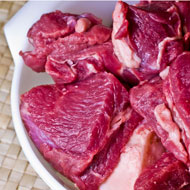Defra will consider method-of-slaughter labelling

Defra says there will not be a ban on religious slaughter.
An e-petition calling for a ban on slaughter without pre-stunning, as well as better food labelling, has reached 66,000 signatures.
Defra has responded by saying the Government "would prefer to see all animals stunned before they are slaughtered for food," but there will not be a UK ban on religious slaughter.
Currently, European and UK legislation requires all animals to be stunned before slaughter, rendering them insensible to pain.
A exemption in the law allows non-stun slaughter for certain religious communities - Dhabihah slaughter for Halal food and Shechita slaughter for Kosher food.
The Prime Minister recently confirmed that this Government will not consider a ban on religious slaughter in the UK.
However, Defra said it agrees "consumers should have the necessary information available to them to make an informed choice about their food."
Launched in April by the BVA, the petition called for food to be labelled with the method of slaughter while the practice of non-stun slaughter is allowed by law. It received 50,000 signatures in just two weeks.
While BVA president Robin Hargreaves says he is "disappointed" there will be no ban on slaughter without pre-stunning, he said he was "encouraged" that the Government will consider food labelling.
A European Commission study will be carried out on method-of-slaughter labelling this summer. Defra says it will look at "possible options" in light of the findings.
BVA has stressed that its campaign does not relate to religious beliefs, but animal welfare. Scientific evidence has shown slaughter without pre-stunning compromises welfare.



 The latest
The latest